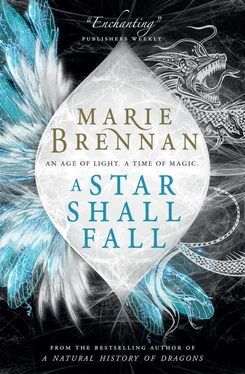Cavendish suddenly bounced where he stood, a stiff-legged hop that would have been comical had Galen been less desperate. “Saturating the air! If phlogiston moves from wood to air, and stops when the air is saturated, then perhaps it could be contained by material already filled to the brim with it.”
“Wood?”
The young philospher shook both hands by his head, as if warding off distraction. “Too fragile. Gold? Though how you’d get the substance inside, I’m not sure. Draw it into something lacking phlogiston, I suppose, but then you’d lose the purity. If you would let me see your sample—”
Gold. Not iron. Galen had no idea if it would work, but Cavendish had told him what he needed to know; the container had to be something saturated with fire. And the fae had gold they said was drawn from the sun itself. If anything would suffice…
“Thank you, Mr. Cavendish,” he said, the words almost tumbling over each other in his rush to get them out. “I must go, my apologies, but I’ll let you know what happens—this has given me an idea—”
With Cavendish’s protests following him, Galen fled out the door and downstairs, running to find the dwarves.
CINNAMON STREET, WAPPING
12 April 1759
Irrith hadn’t been in the eastern parts of London for a hundred years. There was a lot more of eastern London now, and while she’d seen it from the air when she rode with the Queen on All Hallows’ Eve, going through it on foot was rather different. She passed all manner of strange people, scarcely one in five an Englishman, or so it seemed: Irish, Negroes, Lascars, and more, living cheek by jowl among the workshops that served the docks and the ships crowding the river.
She didn’t know her way around, and she didn’t know where to go, either. It took more than an hour of questioning before someone could point her to the shop of the Jew Schuyler. It was her one hint of direction: Abd ar-Rashid lived near the Dutchman who made the lenses and mirrors for the Monument, and the bowl they used to summon the clouds. No one had seen the genie since Dr. Andrews died, and so she had to find him the hard way.
The girl inside the shop listened to Irrith silently, as the sprite tried to describe the bowl; then she vanished, still without a word, through the curtain behind the counter. A moment later, a gray-haired Jew came out. “Why do you look for him?” Schuyler asked, wariness clear even through his accent.
“I need his help,” Irrith said, realizing too late that she might have sounded more sympathetic as a woman. Schuyler looked as if he expected Irrith to assault the Arab when she found him. Around here, that’s probably a fair fear. The docks were just a stone’s throw away, with all their drunken sailors.
After a moment Schuyler jerked his thumb to the side. “End of the street. There is a house with lascars in it; he lives on the top floor.”
She found the dark-skinned sailors, and the staircase that served their house. Irrith took the steps three at a time, and pounded on the door at the top.
The man who opened it didn’t look like an Arab. Nor did he seem quite like a fae; whatever Abd ar-Rashid did to disguise himself, it didn’t feel the same as an English glamour. But she knew it was an illusion, and knew it was him.
And he knew it was her—or at least a faerie. He backed up sharply. Irrith held her hands out, soothingly. “It’s me. Irrith. I’m just here to ask you something.”
The strange-looking man hesitated, but finally beckoned her in, and closed the door behind her.
“It would have been a lot easier to find you if you hadn’t vanished,” Irrith said, glancing around. The genie appeared to live in a single room, with few possessions: a narrow bed, a few cushions, a shelf of books. She supposed exotic silks were unlikely, if he was trying to live as an Englishman, or whatever he was supposed to be. His clothing wasn’t English, though it was less showy than what he normally wore.
“I know,” he said, and his voice was the same, accent and all. “That was the hope.”
She turned to face him, surprised. “You didn’t want to be found? Why?”
His illusion didn’t drop away like a glamour, either. His flesh looked like it was shifting, rippling into a different shape, and darkening as it went. It steadied into the genie’s familiar face, and a frown. “I suggested alchemy to the Prince, and to Dr. Andrews. I determined the best source for sophic mercury. I helped devise a plan for the use of that mercury. I, a foreigner, did all these things, and because of it, Dr. Andrews attempted to murder your Queen. And you ask why I wish not to be found?”
Irrith hadn’t thought of that. Neither Galen nor Lune blamed him, so far as she knew, and no one else had said anything in her hearing—but then, she hadn’t spent any time listening for it, either.
She ducked her chin, embarrassed. “How long will you hide for?”
“There is a ship leaving for Cairo in five days.”
“Cairo? Where is—” It didn’t matter where Cairo was. “You’re leaving ?”
He nodded.
“What, you’re just going to run away? Better hope we can keep the clouds up for five more days; otherwise your ship may burn before you can get on it.” The floorboards creaked mightily beneath Irrith’s feet as she stamped toward him. “You’d best not hope to come back, either. Because if you run away, people really will think you had something to do with Dr. Andrews’s plan.”
The genie was at least a foot taller; he held his ground as she glared up at him. “They already do. How can I convince them otherwise?”
He wanted to. She heard it in his voice, and she believed it. Irrith’s anger melted away, and left behind something like her usual grin. “You can help me. Which is what I came for in the first place. There’s a challenge on, to see who can throw their life away more uselessly, the Queen or the Prince. I’m trying to stop them. But right now, our only other plan is to stab the Dragon with a big icy spear. We need something better.”
Abd ar-Rashid frowned thoughtfully and moved away, pulling two battered cushions from inside the chest at the foot of his bed. He gestured for Irrith to sit on one, and by the time she’d done so, a coffee urn and two bowls had appeared from nowhere. Sighing inside, she accepted one, and hoped he would get distracted before she had to drink it.
“Beyond the spear,” she said, “there are two other possible plans. One is that Galen thinks gold could be used to trap the Dragon. I don’t quite understand his argument, but it has to do with that flodgy—oh, I can never remember the word—”
“Phlogiston,” he murmured.
“Yes, that. Some philosopher Galen knows says it goes into materials that aren’t already full of it, and so if we trapped it in something already full of fire, it wouldn’t be able to go anywhere. They’re planning to use sun-gold.”
The genie’s frown deepened, and he cupped his coffee as if it held the answer. “Because gold does not calcine. It melts, though, and very easily. This trap might work for a time, yes—but not for long.”
As Irrith had feared. “Can you find a way to keep it from melting?”
“In the time we have? I doubt it very much.”
We. He wasn’t getting on that ship to Cairo, Irrith suspected. Not unless the Onyx Court was destroyed in the next five days. “The other possibility is the philosopher’s stone. Even if we had sophic mercury, though, the Queen’s afraid it would just create a Dragon nobody can destroy, that would still burn down London.”
Abd ar-Rashid jerked, and his coffee almost slopped onto the floor. “But—the philosopher’s stone is perfection. Something that brings perfection to others. Surely—”
Читать дальше












